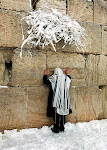8 Elul 5769
Obviously, the basic premise behind Teshuva is doing good and avoiding evil. This assumes, however, that a person knows the difference between good and evil.
But wait, you say. Of course I know the difference between good and evil! Well, to tell you the truth, those lines are much more blurred than you might think.
What would you say, for example, about killing somebody? That surely must be a heinous, evil act, right? Well, that may be so, but then why do we have a mitzvah to kill everybody in the nation of Amalek? Or a mitzvah to kill a Rodef, someone who's trying to murder you? Or a mitzvah to wipe out the seven nations of Eretz Yisrael - you know, the Chittie, the Prizi, the Yevusi, etc. How can we possibly have a mitzvah of genocide? That's right - we have a mitzvah to wipe out Amalek. Almost every Jew knows this. If murder is such an evil act, how can we have such a mitzvah?
Or take, for example, the idea of chessed, of doing kindness for someone. That surely is a good deed, isn't it? Well, this week's parsha (Ki Seitzei) discusses a Ben Sorer U'Moreh, a rebellious son. The next discussion right after that talks about someone who does an aveirah which makes him liable to the death penalty - ki yih'yeh b'ish chet mishpat mavet. Rashi on the spot explains why the two topics are back to back: because if the parents of a Ben Sorer U'Moreh have mercy on their son, and they extend kindness to him and don't bring him to Beis Din, he will end up performing a sin that will cause him to be liable to get misas bet din.
What's going on over here? I thought it's good to be merciful, it's good to do kindness! How can doing kindess be something that's frowned upon?
So you may have guessed the answer already. Good and evil is not defined by one singluar action. It's all based on context - what were you doing when you performed the act? Were you killing a fellow Jew, or killing an Amaleki? Were you doing chessed for your next door neighbor, or for a mass murderer? (For more on how perverted chessed can be, check out the following article on Aish - apparently the Scottish government just released the guy who killed 300 people by bombing an airplane twenty years ago. http://www.aish.com/ci/s/54944532.html)
And what is the moral compass by which we use to judge each context? The Torah. Not Western morals, not Christian morals, not Arabic morals. The Torah is what tells us what is good and evil. If we are able to take this to heart, that it is not our own moral compass that determines right and wrong, but the Torah HaKedosha, then iyH we will be zoche to be matzliach in our Teshuva efforts.
Hatzlacha Raba!
Friday, August 28, 2009
Subscribe to:
Post Comments (Atom)

No comments:
Post a Comment